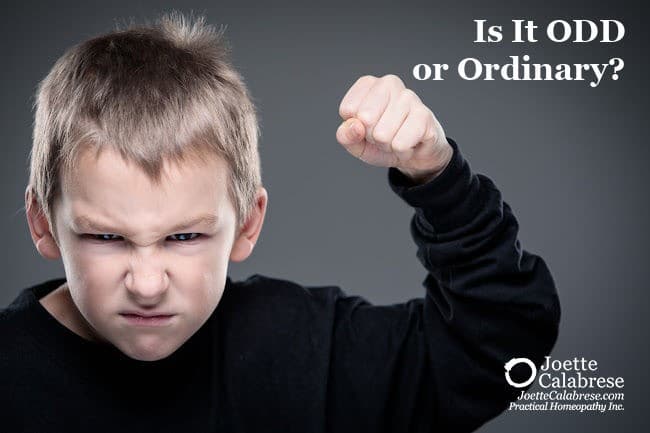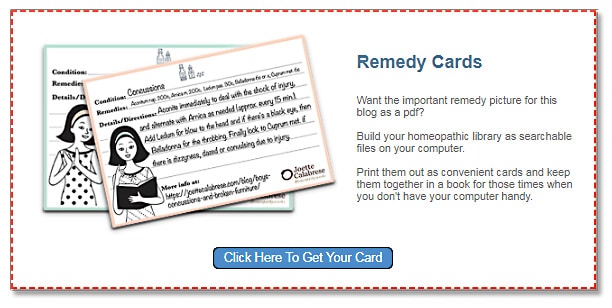Our children are targets.
Commercials target them for expensive toys and sugary cereals.
And all too often, psychologists and other “experts” target them for the disorder du jour.
Now, don’t get me wrong. Some children do have emotional or behavioral disorders that should be attended to — hopefully, however, not with drugs of commerce.
We know it is best to address both physical and emotional issues with our relatively safe, efficacious, polite homeopathic medicines. In fact, we’ve covered ADD before in a blog post, Attention Deficit Disorder and Homeopathy.
However, I’ve noticed quite a few questions on our forums regarding diagnoses of ODD (Oppositional Defiant Disorder) in children.
Let's begin here: It’s practically a child’s full-time job to push the envelope and try your patience. That is ordinary.
But if your child is frequently angry, defiant and vindictive towards you or others in authority over them, they may end up being targeted by healthcare professionals as having ODD.
I’m going to be a bit controversial here (I’m sure that doesn’t surprise you), but back in my day, we didn’t have all these acronyms for child behavior. We just tossed them all under the umbrella labeled “poor parenting.”
But today, we live in a very permissive society.
Instead of explaining every little bit of our reasoning to a child, we used to tell them to “stop it” and put them in their room.
“Why, Mommy?”
“Because I said so.”
Full stop.
End of story. End of argument.
I have referred many mothers to the work of Dr. John Rosemond, a psychologist with old-fashioned thinking. His books are great, but if you’re too busy to read, he had quite a few YouTube videos you can peruse (instead of wasting time on Netflix).
You see, as Dr. Rosemond espouses, too much permissiveness — too much explaining — allows the child to see all the cracks he can weave his way through instead of understanding this is the way it’s going to be.
I did it myself! I was permissive with my first child. But by the time I had my second, I couldn’t stand it anymore. I straightened myself out!
What I was doing had never occurred to me as being permissive. It’s an easy thing to miss — especially if one lives in a community of other mothers who do the same thing.
With a nod to Dr. Laura Schlessinger, when behavioral problems arise, punish the child with something “swift, horrible and unexpected.”
Now, of course, I don’t mean something horrible to you; I’m not talking about beating them. I mean something horrible from the child’s perspective!
For instance, if your child loves their Legos, then take those Legos away. When they get older, it becomes no skiing, no slumber party, or no night out.
So, when they are throwing a tantrum, I urge you to act without warning.
Don’t say, “I’ve told you this before. You’d better stop or …”
No.
No.
No.
Just take the Legos away. End of discussion.
This is every bit as much about changing your behavior as it is about changing their behavior!
Trust me, removing something they adore is something they will never forget! It’s swift, horrible and unexpected.
But what if you and your spouse have already done all of that (and I mean REALLY done all of that), yet your child is still obstinate and oppositional? If you are positive the issue is not a result of parenting, then it’s time to call upon homeopathy for help:
Stramonium 6, twice a day until very much better
However, there is one huge caveat: Do not give this medicine “just because.”
Just because your child is acting out, they might not have an emotional pathology requiring a homeopathic medicine.
That’s where observant, intuitive and steadfast parenting comes in. As I used to say when I was raising my boys, “I’m not here to be their best friend. Right now, I’m here to be the SOB who keeps them on the straight and narrow. I’ll be their best friend later in life— after I’ve raised them.”
But when you are positive there is an underlying behavioral disorder, Stramonium could be the answer.
It’s certainly a better answer than allowing the school psychologist to target them for synthetic medicines that might cause all manner of undesired side effects. Not to mention the invasion of your child's privacy.
In my course, Mindful Homeopathy: Practical Protocols for Mental and Emotional Conditions, I discuss other childhood psychological diagnoses — such as ADD and ADHD — along with the homeopathic medicines that address them.
This online course is packed with protocols I’ve used successfully for mental and emotional conditions through my years of personal and professional experience. Plus, we’ll go through specific case studies offered by students just like you.
There is a time (as I’ve discussed here today) when behavior modification is all that is needed. Still, there is most certainly a time for homeopathy when dealing with carefully diagnosed mental and emotional issues!
So, pass on the good news of homeopathy to other mothers and others! And consider forming a community of caring, strong-minded parents so you can support each other.
Warmly,
P.S. If you are curious about Mindful Homeopathy: Practical Protocols for Mental and Emotional Conditions, please click here to download my free infographic, “9 Mindful Homeopathic Protocols.” Then, simply follow the prompts if you want to learn more about the course.
And remember — all of my Mighties (Joette’s Mighty Members) qualify for a 10% discount on course purchases. If you need assistance getting your discount, email [email protected] for more information.






Wow ! Ironically I have a homeopathic Dr I see in Canada for myself . I started taking my son with me for emotional issues , his dad died suddenly when he was 10yrs old. We broke up when he was 4 yrs old. Many sudden blows to him so young and deaths of older grandparents. Like I said at 10 yrs old it all started with anger / irritability, defiant behavior . So many counselors, for years , even when I took him to Canada with me , it was a fight . Telling me I was weird for going that far for a Dr. refusing to talk and enjoying torturing me . He is 21 yrs old now. And the same things are still happening. I beg him to come with me and it’s a fight . Anything I ask him to do is always “ I’ll do it later”. The fighting , screaming , the. names he has called me , brought me to tears . The drinking , pot are out of control . I’m Exhausted. And what’s worse is he won’t let me help him . I beg him to get any kind of help. Homeopathy has helped me tremendously with the help of if a patient caring Dr. He is 2nd and his daughter I see 3rd generation homeopathics The stress this has done to my body is insane. I just pray , maybe one day soon before someone puts him on prescription meds , for life . It’s just been awful, god awlful.
OMG Joette, you are so great. One mother I know would give her child a dirty look to wilt a plant if she stepped out of line and the kid would get it together QUICK. Her kids are happy, well-adjusted, and her daughters are best friends. Another mother I know let her kids get away with behaviors that would make your toes curl, and her kids are miserable and they fight constantly, even as adults. So yeah. The word is NO.
I’ve found Strammonium to be a very effective medicine for my son who seemed so stuck in the extremes despite troubleshooting with diet (which believe me food allergies had such an impact as to the frequency, duration, and extremity of the tantrums and destructive behaviour- soy, gluten, food colourings, and then a histamine reaction with almonds). We have been parenting like Joette described from the start and yet he still had daily intense meltdowns and argued almost constantly. Strammonium was an answered prayer to have him able to stay in school where he really wanted to be and actually be able to learn.
He has a way to go, but he’s able to enjoy his life within the rules for majority of the day which seemed too much of a dream for so long. I’m so grateful for the quality of life homeopathy has given my boy, he’s actually able to have a childhood.
“SOB who raised them”…I laughed out loud!!! Cutting to the chase is your spiritual gift! I don’t think it’s actually listed in the New Testament as a spiritual gift, but it should be! 😉
I totally agree with Nancy!! Love the blunt straight in your face way of teaching you do Joette. Keep up the wonderful work you do.
I don’t see 6 listed on the link to buy for Washington. Can you please clarify the potency?
I spent 25 years working as a nurse in Child Psychiatry. I do not see oppositional behavior as a disorder. I see it as a symptom. In about 90% of cases I can find another cause for the child’s opposition. These causes include depression, ADHD, hearing problems, learning disabilities, autism & abuse. I think diagnosing a child as ODD, is often related to the lack of the professional getting to know and understanding the child. This of course, is just my opinion.
Mary, I agree with your experienced observation. The wonderful thing about homeopathy is that treating the symptoms of a bigger issue can reverse said bigger issue. So, in the end, temporarily identifying a child with ODD allows the treatment to be more swift rather than spending time deciding exactly where the poor behavior is stemming from, which may take months or years of psychiatric help. Homeopathy doesn’t address whatever environment the child is in that is causing the problem, but it helps the child deal with their issues in a healthy way by helping the brain function properly. Hope this provides some interesting insight into the power of homeopathic treatment.
Bianca- you can get it at OHM or Helios
Hi Joette!
In a child that presents both ODD and ADD or ADHD and also may have gone through some traumatic events such divorce or some form of physical violence and developed some fear what would you address first?
The ADD , the ODD or the other symptoms.
I have read your posts on each of them but I giving an scenario where all of these are present.
Thank you very much
Pdt also, I am your student taking feminioathy and left couple of questions on your blogs, I’m not sure if this is the beat way to post my questions as I go along with the course? Otherwise guiding me further would be much appreciated.
Thank you once again.
I urge you to read up on any of the medicines you’re considering before using them. Homeopathic medicines cover a myriad of conditions so it’s a matter of knowing the ability of the medicines when you’re at a crossroads.
If you’ve not already taken my online course “Mindful Homeopathy” it would be in your best interest to do so and when you do, my recommendation is that you watch and study it from the beginning to the end…four times. Yes, if you want to fully understand the subject, four is the magic number particularly when you’re on the fence about how to proceed.
You might want to go to the student forum for the classes that you’ve taken and engage in discussions with other students. I don’t answer questions on these sites. However, there are live, guided classes where you may join an active group. Contact my office and Eileen will direct you as to how to join one or many of these groups.
Does your mindful homeopathy course cover behavioral problems and mental illnesses in children with fetal alcohol syndrome, prenatal drug effects and trauma? I’m desperate to figure something out for my baby.
Yes.
I’m just reading this article for the first time and I have to say THANK YOU for pointing me to John Rosemond’s work. I just ordered one of his books and watched a few of his videos. Thanks for all that you do to help families. You are truly a blessing! God bless you!